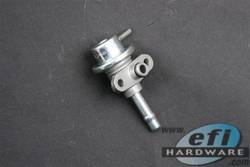The fuel pressure regulator is the heart of a vehicle. It is a management component found in one form or another on virtually all internal combustion engines. As its name suggests, it is responsible for regulating the fuel pressure through the system. You can face some common problems in your car such as acceleration and fuel inefficiency, fuel leak and black smoke coming out from the exhaust pipe of the car. In this case, you need to change the fuel pressure regulator.
It will come to your notice that several fuel pressure regulators use vacuum operated mechanical diaphragms to change the pressure. Nowadays, most of the vehicles are equipped with electronic fuel pressure regulators. The fuel pressure regulator directly distributes the fuel to the engine. If you notice any issues with the component, it can potentially cause performance issues in the vehicle. In this article, we will provide you with some signs of a failing fuel pressure regulator so that you can take measures to prevent such problems.
 |
| Fuel Pressure Regulator |
-
Leakage
One of the common symptoms of a failing fuel pressure regulator is fuel leaks. You will notice the fuel pressure regulator's diaphragm can pop up in no time. Fuel leaks not only create a faulty regulator but can also cause several performance issues. If you find black smoke coming out from the exhaust pipe then there must be some leakages in the fuel regulator, and you need to change it as soon as possible.
-
Blackening of spark plugs
You should make a habit of removing the spark plug and examine it from time to time. If you notice it has become sooty, then it could be a sign of a bad fuel pressure regulator. A dirty spark plugs often caused due to the engine burning oil at that cylinder.
-
Black smoke
When the exhaust gives off black smoke, it is another symptom of a common issue with the vehicle's fuel pressure regulator. The fuel pressure regulator leaks can cause the car to emit black smoke from the tailpipe. Not to mention, when it is failing your vehicle will cause you so much money of refueling along with the reduction in mpg and performance.
-
Smell of Gasoline
One of the easiest ways is to check the oil dipstick for fuel smell on it. It is a symptom of a failing fuel pressure regulator due to leak into the oil system. So if you find gasoline dripping out of your tailpipe, which happens because of overfilling your tank then you must check the fuel pressure regulator.
-
Stalling of engine
If you notice the engine is stalling when you press down on the gas pedal, then it is also a sign. A healthy regulator will not cause any obstruction when you press the accelerator, and you must fix such issue as early as possible.
-
Poor engine performance
Another sign that your engine is failing due to fuel pressure regulator is your car causing issue to get started. You will notice that your engine will not run smoothly. This issue is caused when the regulator is creating some problems in your car performance. You need to change your fuel filter to repair bad fuel pressure.
These signs begin to show up quite quickly when the fuel pressure regulator is having performance issues. The low performance will disturb the fuel pressure of the vehicle, which throw off the engine's air-fuel ratio and tune in a dramatic change. A failing fuel pressure regulator can cause misfires, a reduction in power and acceleration, and a drop in fuel efficiency.


